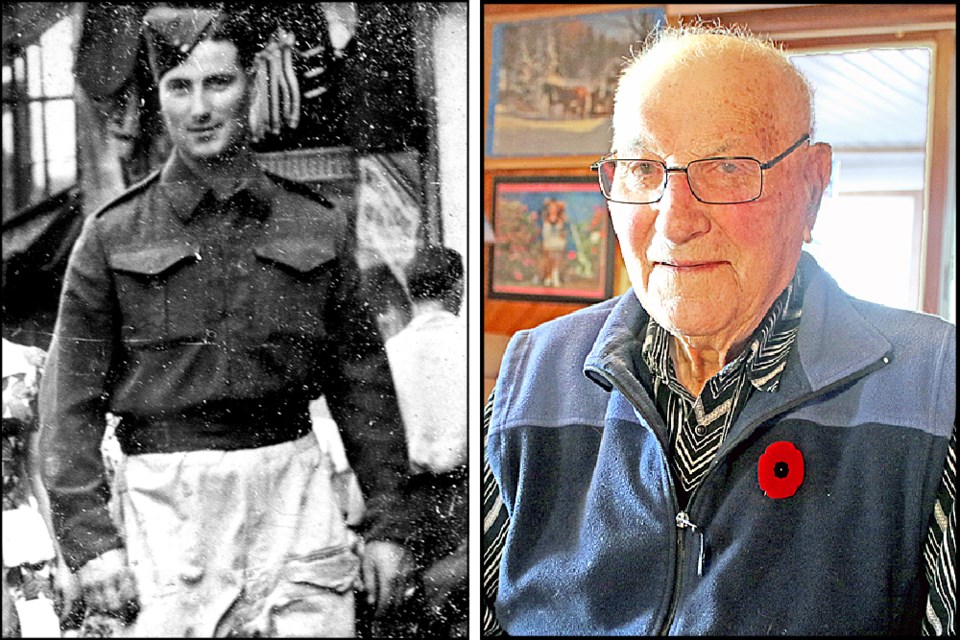When Eugene McFarlane got the call to serve during the Second World War, he answered it.
McFarlane, who was from Gronlid, was conscripted through the National Resources Mobilization Act of 1940 and told to report to Regina in late May of 1941 for basic training.
“You could go to jail if you didn’t answer your call. Some did that,” he said.
Those conscripted under the original act were to be used for home defence only, unless they became active servicemen.
“They wanted everyone to be active. As soon as you got active, you went overseas,” McFarlane said. “I wasn’t out to kill somebody else that I didn’t know.”
That later changed in 1942, after a national plebiscite allowed the government to send conscripts overseas.
So on May 21, 1941, when he was either 21 or 22, McFarlane reported in for basic training.
“It was supposed to be a four month training deal and then we got in and they changed their mind and we were in for the duration. Four months got to be four and a half years.”
McFarlane had actually tried to transfer into the Air Force, but the Army denied the request.
After two months of basic, McFarlane transferred to Dundurn, Sask. to receive advanced training to join the engineer corps. He would serve in the Fourth Fortress as a Lance Corporal.
“Somebody got one of those contagious diseases and we were quarantined for a month, so I wasn’t with the rest of the draft,” he said. “Then the Pearl Harbor deal came up and they wanted us all on the west coast in case the Japanese wanted to attack the west coast of Canada. They were quite concerned, so I spent most of my time out there with the engineers.”
In December 1941, McFarlane transferred to Prince Rupert, assigned to a unit that looked after all of the camps in the area.
“When we were in Prince Rupert, they didn’t know what to do with us. I guess to kill time we were packing logs. It was on an island where all of the ships had to come in,” he said. The idea was to create a corduroy road. “That was some of the work we do to – I guess – keep us in shape.”
Then, in 1943, McFarlane transferred to Vancouver, where he drove a truck. He remembers driving through the fog, following streetcars to figure out how to get around.
He also remembers how the Vancouver Sun looked down upon the conscripts. There was a lot of tension between those that had chosen to join the military – and therefore had to go overseas – and those that were conscripted. There was a lot of pressure for the conscripts to volunteer for active service. McFarlane recalled how some would go to the bar, get pressured by a recruiter and find out they were in the active service when they sobered up.
“I wasn’t very impressed with that Vancouver Sun. They called us a bunch of zombies [a derogatory term for conscripts], so I’ve never been a fan of the Vancouver Sun,” he said, “Just because we answered our call. We didn’t do anything wrong. That was their opinion of us but if the [Japanese] attacked the west coast, they’d have thought differently.”
In February of 1945, the war effort was short of recruits, so they planned to send McFarlane overseas, sending the men on a train on a troops transport McFarlane compared to a cattle car. They stopped at a base at Debert, N.S.
“When we went to Debert, we were supposed to be going to England and get some more training, but the war ended, so I never got across the ocean.”
When victory in Europe was declared, public transit and bars in nearby Halifax were closed in an effort to maintain public order, but a bunch of sailors, wanting to celebrate, rioted in the street, breaking into places to grab some drinks. The troops in Debert were called to patrol Halifax and restore order.
“I was on leave that day, otherwise they picked up every soldier in camp and tried to quench the riot,” McFarlane said.
For McFarlane, the war was over.
“Then I got a farm leave after that and I went home and farmed for 67 years, got married, raised a family.”
When he came back to Gronlid, the farmers had done well in the war, with some starting to mechanize. McFarlane was able to get some land through the Veterans’ Land Act.
In 2010, McFarlane’s wife passed away. In 2011, he remarried and moved to Nipawin, where he resides today.
For McFarlane, Remembrance Day is an important occasion.
“I think of many of the guys that never made it back and half of them didn’t know what they were fighting for.”




